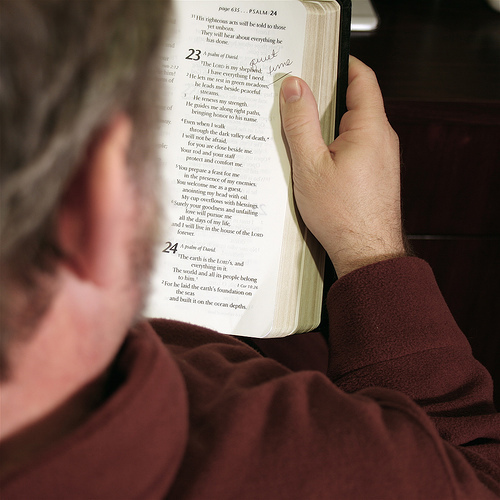Randy Alcorn's Blog, page 180
May 28, 2014
Will Extinct Animals Live on the New Earth?
 Someone wrote to me, “My children are hoping extinct animals will be in Heaven, maybe even dinosaurs.” Is this merely a child’s fantasy? I think it’s a question based on a rational conclusion. Were dinosaurs part of God’s original creation of a perfect animal world? Certainly. Will the restoration of Earth and the redemption of God’s creation be complete enough to bring back extinct animals? Will extinct animals be included in the “all things” Christ will make new? I see every reason to think so and no persuasive argument against it. I think we should fully expect that extinct animals and plants will be brought back to life. By resurrecting his original creation, God will show the totality of his victory over sin and death.
Someone wrote to me, “My children are hoping extinct animals will be in Heaven, maybe even dinosaurs.” Is this merely a child’s fantasy? I think it’s a question based on a rational conclusion. Were dinosaurs part of God’s original creation of a perfect animal world? Certainly. Will the restoration of Earth and the redemption of God’s creation be complete enough to bring back extinct animals? Will extinct animals be included in the “all things” Christ will make new? I see every reason to think so and no persuasive argument against it. I think we should fully expect that extinct animals and plants will be brought back to life. By resurrecting his original creation, God will show the totality of his victory over sin and death.
It’s apparent that the Curse that fell on the earth resulted in some species dying out. But God promises, “No longer will there be any curse” (Revelation 22:3). And because it seems that the Curse will not merely be nullified but reversed, it seems likely that God might restore extinct animals and plants on the New Earth.
Animals are created for God’s glory. What could speak more of his awesome power than a tyrannosaurus? When talking to Job, God pointed out his greatness revealed in the giant land and sea creatures behemoth and leviathan (Job 40–41). Why shouldn’t all people have the opportunity to enjoy these great wonders of God on the New Earth?
Imagine Jurassic Parkwith all of the awesome majesty of those huge creatures but none of their violence and hostility. Imagine riding a brontosaurus—or flying on the back of a pterodactyl. Unless God made a mistake when he created them—and clearly he didn’t—why wouldn’t he include them when he makes “everything new”?

Each blog regularly appears on my Facebook page where people often comment on it. If you’d like to comment or see others’ comments, we invite you to join us there.
photo credit: Thomas Hawk via photopin cc / corners rounded from original
May 26, 2014
Meditating on God’s Word, a Verse at a Time: One Woman’s Hand-copied Bible
I wanted to share a recent message that came to me. A woman wrote:
Randy, here are pictures of my hand-copied Bible. This 9 plus year journey started when I read Safely Home. The main Chinese character’s mother hand copied the Bible. This struck me because I would always study and learn by recopying notes. Thus began my totally nonwestern world spiritual journey of recopying the Bible by hand, red letter edition no less. A mutual friend said I should send you pictures of it. The second part of the journey is where God takes this....it's all up to Him.

What a way to meditate on God’s word! (And don’t you love her handwriting?) I got the idea of including the passage in Safely Home about believers hand-copying Bibles from my research about persecuted Christians who do this very thing in parts of the world where printed Bibles aren’t accessible. In this scene from the novel, American Ben Fielding returns to the home of his Chinese friend Li Quan and finds several believers laboring to copy Scripture:
Ben spent Friday evening at a dinner meeting with a Pushan business executive. He pulled into Quan’s place much later than usual and put his hand on the doorknob. It was locked.
“Who is there?” came the voice from the inside.
“Ben.”
“Alone?”
“No— I’m with the Chinese joint chiefs of staff.”
Quan opened the door.
“What’s going on?” Ben asked.
“We have visitors.”
Ben walked in and saw what looked like two families of three. A man, woman, and teenage boy were on Quan’s bed. Another man, woman, and teenage girl were on Ben’s bed. Ming sat at the desk and Shen on the floor at her feet. All had two open books in front of them, and ballpoint pens in their hands.
“What are you doing?”
“Making copies of Shengjing. Those printed Bibles will soon be picked up by the donkey and passed on to others. But while they are here we can use them, can’t we? Shen and I are copying from my mother’s Bible.”
With a proud smile Shen held up his grandmother’s Bible to Ben. Then he picked up his own handwritten copy, handing it to Ben for inspection.
“Shen is a good scribe,” Ben said.
“Father checks my work,” he said, beaming.
“As we copy,” Quan said, “the words of Yesu are written on our hearts.”
Is this legal? Ben wondered. He remembered all the reassurances of religious freedom he’d been given over the years. But seeing these people huddled like this, it was obvious they were convinced it was illegal. But he didn’t want to hear the words. If something hit the fan, he wanted to maintain deniability with Martin and the Getz board.
Ben was about to go for a walk, anything to get him away from this, when he looked closely at Quan’s mother’s Bible. “It’s beautiful. The characters are so small but clear.”
“Mother copied it carefully. She would borrow a Bible whenever she could. She’d work for hours by candlelight, praying the words aloud as she copied. I wish I would have listened more closely. Often she would rest her head on Shengjing. Sometimes she would giggle with delight. It was a labor of love. Months, even a year, went by when she had no Bible to copy. It took her eight years to finish her whole Bible. Six months before she died, Mother finished copying Shengjing’s final book. A leather worker in church bound it for her.”
“And you kept it all these years?”
“No. She had loaned it to another woman who was copying it at the time. After I returned from Harvard, they heard I had become a Chris¬tian. The church gave it to me.”
Ben flipped through the pages. “It’s been out in the rain.”
“No. Always it was carefully covered. Mother bundled it up before going outside. We do the same.”
“But the words are smeared in many places,” Ben said.
“It was not rain that smeared the words.”

Each blog regularly appears on my Facebook page where people often comment on it. If you’d like to comment or see others’ comments, we invite you to join us there.
May 23, 2014
The Power of Brief Words of Encouragement
Awhile back I ran across this blog post from one of our friends, Kristy Patty. Kristy and her husband Josh and their four children are serving with Josiah Venture as missionaries in Slovenia (Eastern Europe), a country that desperately needs the light of Jesus:
Slovenia is a country with 2 million inhabitants and is about the size of New Jersey. Only 1,100-1,200 people in all of Slovenia claim to be evangelical Christians. This places it among the most un-evangelized countries of the world. The Lord has given the Josiah Venture team in Slovenia opportunity to partner with local churches and be a light in some dark places. After five years of slow toiling work, we are beginning to see a handful of Slovene youth with a passion to change their world with the love of Christ.
Kristy writes:
I found a letter in a pile last week.
We have lots of letters in lots of piles to tell you the truth. But this letter was one that would change my life.
Only I didn't know it at the time.
On February 27, 1988, some of us youth group kids gathered at the Norquists' house in the basement. The Norquists’ basement was sort of sacred ground for our church. Many things found their starting point at that home.
This particular evening Randy Alcorn was sharing. He talked about being a missionary in whatever context the Lord calls you. He told stories about people who served sacrificially at home and abroad. Several things stand out to me from that time but none of them more than this.
Randy asked us, "If you would be willing to go if the Lord sends you to another country, then I'd like you to write your name on this list and we will ask the elders to pray for you regularly."
My thought was, “How could I say I wasn't willing if God called me?” Of course I would. But He wasn't going to send me. I'm not so good with new or unfamiliar things. My mom says she once had to carry me out of the shoe store because I refused to walk in the new shoes she'd bought me. I drive the same way all the time because it's the way I know. I can eat the same thing every day! It's familiar. But I wrote my name on that paper, fairly confident that I wouldn't be one of the ones being sent.
Two weeks later Randy had sent the letter I mentioned.
It started off, "Dear Kristi, Hi! I'm sending this letter to all the people who said, ‘Yes, I want my church leaders' prayer and assistance as I consider whether God would have me serve Him in another country.’” He went on to suggest some books we could read and also told about a trip his family was taking to visit missionaries our church supported. I think my favorite line was, "Maybe ten years from now we'll be visiting you on the mission field!"
Just a few weeks later I had met Josh and turned in my application to attend Multnomah Bible College.
Ten years later Josh and I had served in England and at that time we were in Germany leading youth groups for military kids. We already had two children and were on the verge of our move to Slovenia just 2 years later!
I love being a missionary and feel so blessed by the life we've led, though I never would have guessed it! And I love being from Good Shepherd! I love that I grew up in a safe and nurturing home church as I kept taking small steps along the path the Lord was lighting for me. I'm grateful for wise leadership that knew how to strengthen and encourage growth.
 I’m so proud of Kristy and Josh and their amazing family, who God has used in wonderful ways. I am humbled that God used me in some small way in their lives, and I’m aware of how God has used the words of many others in my life.
I’m so proud of Kristy and Josh and their amazing family, who God has used in wonderful ways. I am humbled that God used me in some small way in their lives, and I’m aware of how God has used the words of many others in my life.
One of my favorite theology professors, Dr. Joseph Wong, scratched on a term paper I wrote: “You should consider being a writer.” It was an encouraging word from him to me, and I took it to heart. There’s a power to brief encouraging acts and words—something anyone can do.
“A word aptly spoken is like apples of gold in settings of silver” (Proverbs 25:11).
“The tongue of the righteous is choice silver, but the heart of the wicked is of little value. The lips of the righteous nourish many…” (Proverbs 10: 20, 21).
Who can you challenge or encourage today, so that you make an investment in their lives and can celebrate their success for God’s kingdom, knowing you may have had a small part in it?

Each blog regularly appears on my Facebook page where people often comment on it. If you’d like to comment or see others’ comments, we invite you to join us there.
May 21, 2014
How should the church respond to the legalizing of homosexual marriage?
As many of you have heard, on Monday Oregon's ban on same-sex marriages was overturned by a federal judge. In light of that, today’s video blog (filmed last year) addresses the question:
There’s been a lot of talk in the news and among the evangelical culture in America about legalizing gay marriage. What are your thoughts on how Christians should respond?
In this video interview with Randy and EPM staffer Julia Stager, we share our thoughts:
Randy:
Thanks for bringing up that very easy, non-controversial topic for me! I’m very emphatic on the fact that, of course, I don’t approve of gay marriage. Do I think it’s biblical? Do I think it’s right? No. I also don’t think it’s right for heterosexual couples to be living together outside marriage. But can we control a secular society? The answer to that is also no.
Do I think there is a detrimental effect on the church because of legislation concerning gay marriage? Yes. There are some children who will grow up in the church and will come to think that homosexual relationships are normal. Sin is normalized. But marriage has already been undermined by the large number of heterosexual couples living together. Unmarried people are having sex together with no regard for the sanctity of marriage, and many children grow up seeing that, even in churches. So let’s not have a double standard, where we’re only concerned about homosexual couples.
 So as much as I oppose the attempt to redefine marriage to include same sex couples, with that happening our job remains the same—follow Jesus and obey Him, share the truth in love, reach out in a spirit of grace, and be faithful to Christ in our culture, no matter the legal status of gay marriage.
So as much as I oppose the attempt to redefine marriage to include same sex couples, with that happening our job remains the same—follow Jesus and obey Him, share the truth in love, reach out in a spirit of grace, and be faithful to Christ in our culture, no matter the legal status of gay marriage.
Julia:
We are called in Scripture to be pure and to live in purity and not impurity. Just like you’re saying, homosexuality isn’t the only way to commit impure acts. There are many, many impure things we could become involved with, even just thoughts or heterosexual activity outside of marriage. So I think it’s important to not demonize homosexuality as some sin that is so heinous that it is unforgiveable, or to get to a point where we can’t believe that Jesus would accept a homosexual person.
Randy:
Exactly. You look in Scripture and you see that by far the majority of sexual sins which are condemned are heterosexual sins. Homosexual sins are also included and Scripture makes clear they are an abomination in God’s sight. Romans 1 puts an emphasis on them as an example of the judgment of God coming down on a culture. But again, look also at the Old Testament examples of heterosexual sin. Look at David’s adultery. It wasn’t a homosexual relationship with Bathsheba. It was a heterosexual relationship that was condemned.
Jesus died for sinners. And so for the homosexual couple that lives next door, whether they are legally “married” or not, our responsibility will remain the same, which is to reach out to them in the love and truth of Christ. They’re sinners like we’re sinners, who need the redemptive work of Christ and who can be saved only by placing their trust in Him. The culture changes, but God’s standards do not…and fortunately, neither does the gospel message of forgiveness and redemption in Jesus.

Each blog regularly appears on my Facebook page where people often comment on it. If you’d like to comment or see others’ comments, we invite you to join us there.
photo credit: mathieujarryphoto via photopin cc / Color and corners changed from original
May 19, 2014
God as Master Artist
When you see a purple sunset or a field full of daffodils or a breathtaking mountain vista, what does it tell you about the Creator? This world is far from perfect, but God has given us glimpses of himself—and of the New Earth—in the beauty of his creation.
In a sermon titled “God Rejoicing in the New Creation,” Charles Spurgeon said this:
I must confess that I think it a most right and excellent thing that you and I should rejoice in the natural creation of God. I do not think that any man is altogether beyond hope who can take delight in the nightly heavens as he watches the stars and feel joy as he treads the meadows all adorned with buttercups and daisies.
The man who is altogether bad seldom delights in nature. He cares little enough for the fields unless he can hunt in them, little enough for lands unless he can raise rent from them, little enough for living things except for slaughter or for sale. He welcomes night only for the indulgence of his sins, but the stars are not one half as bright to him as the lights that men have kindled. For him indeed the constellations shine in vain.
One of the purest and most innocent of joys, apart from spiritual things, in which a man can indulge is a joy in the works of God. I confess I have no sympathy with the good man, who, when he went down the Rhine, dived into the cabin that he might not see the river and the mountains, lest he should be absorbed in them and forget his Savior. I like to see my Savior on the hills and by the shores of the sea. I hear my Father’s voice in the thunder and listen to the whispers of his love in the cadence of the sunlit waves. These are my Father’s works, and therefore I admire them. I seem all the nearer to him when I am among them.
If I were a great artist, I should think it a very small compliment if my son came into my house and said he would not notice the pictures I had painted because he only wanted to think of me. In doing so he would condemn my paintings, for if they were good for anything, he would rejoice to see my hand in them. Oh, but surely everything that comes from the hand of such a master artist as God has something of himself in it! The Lord rejoices in his works. Shouldn’t his people do so? He said of what he had made, “It is very good.” If a man thinks that what God has made is not very good, he cannot be very good himself. In this he contradicts his God. It is a beautiful world we live in.
There are lovely spots on this fair globe which ought to make even a blasphemer devout. I have said, among the mountains, “He who sees no God here is mad.” There are things that God has made which overwhelm with a sense of his omnipotence: how can men see them and doubt the existence of the Deity? Whether you consider the anatomy of the body or the arrangement of the mighty heavens, you wonder that the scorner does not bow his head—at least in silence—and own up to the infinite supremacy of God.
O Lord, our Lord, how majestic is your name in all the earth! (P salm 8:9)

Each blog regularly appears on my Facebook page where people often comment on it. If you’d like to comment or see others’ comments, we invite you to join us there.
flower photo credit: chrisotruro via photopin cc
May 16, 2014
Getting Closer to God
 The question of How can I get closer to God? is a really important question. Scripture says, “Draw near to God and He will draw near to you” (James 4:8). So it puts the ball in our court and shows us there are some things we can do.
The question of How can I get closer to God? is a really important question. Scripture says, “Draw near to God and He will draw near to you” (James 4:8). So it puts the ball in our court and shows us there are some things we can do.
One of those things is to first see what God has really said. That’s why I go to the Bible and meditate on it daily. I think about what God has said. I also pray and ask God to work in my life.
In order to have a close relationship with anyone, first and foremost, you must spend time with them. If I’m going to have a close relationship with my wife—which I desire to have—I must spend time with her. The same thing is true with our children. When we were raising our girls, and now we have grandchildren, there’s simply no substitute for spending time with them. That’s how you get to know them and draw close to them.
Another way we can draw close to God is by connecting with people. Our vertical relationship with God and Scripture is always linked to our horizontal relationship with people. Jesus said in Mark 12:28-31 that the first and greatest command is to love the Lord your God with all your heart. And He said there’s a second command that is like it, and connected with it, and that’s to love your neighbor as yourself. People are created in the image of God. So we can actually learn about God from seeing His image reflected in people.
Scripture also tells us that the creation demonstrates what God is like, so even when we look at animals, we should be able to learn more about the Creator. He has created animals for His glory, and also to tell us something about Himself. "For since the creation of the world God's invisible qualities—his eternal power and divine nature—have been clearly seen, being understood from what has been made, so that men are without excuse" (Romans 1:20).
So bottom line, how do we draw close to God? First and foremost we’ve got to spend time with Him.
You will seek me and find me, when you seek me with all your heart (Jeremiah 29:13).

Each blog regularly appears on my Facebook page where people often comment on it. If you’d like to comment or see others’ comments, we invite you to join us there.
photo credit: Sapphire Dream Photography via photopin cc
May 14, 2014
John Wesley’s Example of Giving

To turn the tide of materialism in the Christian community, we desperately need bold models of kingdom-centered living. Despite our need to do it in a way that doesn’t glorify people, we must hear each other’s stories about giving or else our people will not learn to give. (See “Should Giving Always Be Kept Secret?”)
The Christian community should be filled with people who set a cap on their lifestyles, giving away everything above that amount. We need to draw a line and stop accumulating beyond it. Give away everything else. That isn’t even sacrificial giving, it’s just giving according to our ability. Simple as it is, the models are so few and far between that people don’t even conceive of how it could work.
Consider the following story about John Wesley (1703-1791). His perspective was changed as a result of something that happened to him while at Oxford:
[Wesley] had just finished buying some pictures for his room when one of the chambermaids came to his door. It was a winter day and he noticed that she had only a thin linen gown to wear for protection against the cold. He reached into his pocket to give her some money for a coat, and found he had little left. It struck him that the Lord was not pleased with how he had spent his money. He asked himself: “Will Thy Master say, ‘Well done, good and faithful steward?’ Thou has adorned thy walls with the money that might have screened this poor creature from the cold! O justice! O mercy! Are not these pictures the blood of this poor maid?”
Perhaps as a result of this incident, in 1731 Wesley began to limit his expenses so he would have more money to give to the poor. He records that one year his income was £30, and his living expenses £28, so he had £2 to give away. The next year, his income doubled, but he still lived on £28 and gave £32 away. In the third year, his income jumped to £90; again he lived on £28, giving £62 away. The fourth year, he made £120, lived again on £28, and gave £92 to the poor.
Wesley preached that Christians should not merely tithe, but give away all extra income once the family and creditors were taken care of. He believed that with increasing income, the Christian’s standard of giving should increase, not his standard of living. He began this practice at Oxford and he continued it throughout his life. Even when his income rose into the thousands of pounds, he lived simply and quickly gave his surplus money away. One year his income was slightly over £1,400; he gave away all save £30. He was afraid of laying up treasures on earth, so the money went out in charity as quickly as it came in. He reports that he never had as much as £100 at one time.
When he died in 1791, the only money mentioned in his will was the miscellaneous coins to be found in his pockets and dresser drawers. Most of the £30,000 he had earned in his lifetime he had given away. As Wesley said, “I cannot help leaving my books behind me whenever God calls me hence; but, in every other respect, my own hands will be my executors.*
John Wesley’s royalties at one time gave him what today would be an annual income of $160,000. Yet he lived like someone today might at an income of $20,000. Sound radical? Why? Isn’t it perfectly in keeping with Scripture? “Your plenty will supply what they need. . . . You will be made rich in every way so that you can be generous on every occasion” (2 Corinthians 8:14; 9:11). Perhaps you’ll never be as radical as Wesley—I’m certainly not, but his example inspires me and makes me reevaluate my lifestyle and giving.

Each blog regularly appears on my Facebook page where people often comment on it. If you’d like to comment or see others’ comments, we invite you to join us there.
*Charles Edward White, “Four Lessons on Money from One of the World’s Richest Preachers” Christian History 19 (summer 1988): 24.
May 12, 2014
Purposefully Meditating on God’s Word
 Nothing so cultivates the inner person and enriches our relationship with God as biblical meditation. Meditation is the process of pondering, musing, and reflecting upon God and His truth. In the process, our hearts are drawn to God, our thoughts are filled with His thoughts. Ultimately our behavior becomes like Christ’s.
Nothing so cultivates the inner person and enriches our relationship with God as biblical meditation. Meditation is the process of pondering, musing, and reflecting upon God and His truth. In the process, our hearts are drawn to God, our thoughts are filled with His thoughts. Ultimately our behavior becomes like Christ’s.
Meditation is more than reading the Bible. It is musing upon it, rehearsing it prayerfully and thoughtfully. It is not swallowing Scripture whole, but chewing long and hard before digesting it. As a therapy for stress, meditation is often superior to medication. It is during prayerful, Christ-centered meditation that the peace of God is experienced and the inner life is bolstered to withstand the pressures of the outer life.
There is really no secret to meditation. All of us do it daily. We may meditate on a novel, a TV program, a sermon, a song, a shopping list, a friend, or this morning’s sidewalk sale. Right now you’re meditating on this blog. We all do it. The key to meditation is its object.
Biblical meditation focuses on God:
1. His attributes: “Within your temple, O God, we meditate on your unfailing love” (Psalm 48:9).
2. His works: “I will remember the deeds of the Lord; yes, I will remember your miracles of long ago. I will meditate on all your works and consider all your mighty deeds” (Psalm 77:11–12).
3. His Word: “I meditate on your precepts and consider your ways. I delight in your decrees; I will not neglect your word” (Psalm 119:15–16).
Copying Scripture and carrying it with us throughout the day, reading it and memorizing it, makes God’s Word a part of us. As Paul wrote, “Let the word of Christ dwell in you richly” (Colossians 3:16).
We like to hear seven methods and five easy steps and three proven secrets to the Christian life. But there are no shortcuts to spirituality. There is no pill that makes us godly. We become more Christ-like only as we take pains to focus our gaze on Christ. As we meditate on Him, we become increasingly like Him: “But we all, with unveiled face beholding as in a mirror the glory of the Lord, are being transformed into the same image from glory to glory” (2 Corinthians 3:18, NASB).

Each blog regularly appears on my Facebook page where people often comment on it. If you’d like to comment or see others’ comments, we invite you to join us there.
photo credit: Tojosan via photopin cc
Thanks to those who entered last week's Eternity graphic novel giveaway!The randomly drawn winners are:
Jan Harmon (girlsnana@)
Kelley Bagby (kelley@)
Monica Garcia (monicajo83@)
Patti Tryal (patti.tryal@)
Peter Franck (pfranck44@)Winners will be contacted by email.
May 9, 2014
The Courage to Follow Him
 It’s not always pleasant to talk about the things God’s Word says. When I meditate on Scripture, it’s very common for me to become uncomfortable by what I am reading. But to follow Christ is not about being comfortable—it’s about being sold-out to the God with the nailed-scarred hands, being radical for Him, standing up for Him, and speaking the truth in love, with grace.
It’s not always pleasant to talk about the things God’s Word says. When I meditate on Scripture, it’s very common for me to become uncomfortable by what I am reading. But to follow Christ is not about being comfortable—it’s about being sold-out to the God with the nailed-scarred hands, being radical for Him, standing up for Him, and speaking the truth in love, with grace.
Follow the Lord wherever He is leading you, then depend upon Him to give you more courage to take the next step. “If anyone serves me, he must follow me; and where I am, there will my servant be also. If anyone serves me, the Father will honor him” (John 12:26).
Whatever we lose today in humble service to Christ, we will regain a trillion times over in the long tomorrow. “If anyone would come after me, let him deny himself and take up his cross daily and follow me. For whoever would save his life will lose it, but whoever loses his life for my sake will save it” (Luke 9:23–24).
Perspectives from God’s Word
“Whoever loses his life for my sake and the gospel’s will save it” (Mark 8:35).
“Be strong in the Lord and in the strength of his might” (Ephesians 6:10).
Perspectives from God’s People
“Courage seems a contradiction: a strong desire to live taking the form of a readiness to die.” —G. K. Chesterton
“It is easier to find a score of men wise enough to discover the truth than to find one intrepid enough, in the face of opposition, to stand up for it.” —A. A. Hodge

Each blog regularly appears on my Facebook page where people often comment on it. If you’d like to comment or see others’ comments, we invite you to join us there.
May 7, 2014
Eternity Graphic Novel Giveaway
 This week we’re giving away 5 copies of Randy’s graphic novel Eternity, which is based on Christ’s story of the rich man and Lazarus found in Luke 16. If you’re not familiar with the term, a graphic novel is an extended comic book form (128 pages, over 600 panels of full-color art). It was recently nominated as one of the five finalists for the Evangelical Christian Publishers Association (ECPA) Children’s Book of the Year award. Though it didn’t win we were encouraged by the nomination!
This week we’re giving away 5 copies of Randy’s graphic novel Eternity, which is based on Christ’s story of the rich man and Lazarus found in Luke 16. If you’re not familiar with the term, a graphic novel is an extended comic book form (128 pages, over 600 panels of full-color art). It was recently nominated as one of the five finalists for the Evangelical Christian Publishers Association (ECPA) Children’s Book of the Year award. Though it didn’t win we were encouraged by the nomination!
Since its release last June, our ministry has received some great comments from readers of all ages, including this 12 year old: “I read your graphic novel Eternity, and I really liked it. I was at camp this week and felt God working in me through the book. I loved how you portrayed Heaven and Hell in this story. This really made me wonder if I was really saved, and this week I think was the week of my true salvation. I hope that this same thing will happen to others who read this book!”
On the other end of the age spectrum, an 89-year-old reader wrote us to say, “I could not put Eternity down until I finished it!” We’re grateful that readers are enjoying the book, and pray that many will come to salvation through Christ because of its message.
To enter the novel giveaway, please fill out the form below by 9 p.m. PT (12 a.m. ET) on Thursday, May 8 (go to the blog post if you're reading by email or on another feed). We'll announce the winners in Randy’s blog post on Monday, May 12.
By the way, through this Friday, EPM is offering Eternity for $10 (retail $16.99). This book is a great tool for sharing the gospel with those who may not be attracted to traditional books. The illustrations are stunning! Offer expires Friday, May 9, 11:59 p.m. PT.
Stephanie Anderson
EPM Staff








